Taxation Law Assignment: Problem Solving and Case Analysis
VerifiedAdded on 2022/12/26
|11
|3202
|28
Homework Assignment
AI Summary
This taxation law assignment addresses two key problem-solving questions. The first question examines the tax implications for Our Earth Pty Ltd, focusing on damages received for design patent infringement, lost revenue, interest, and legal fee reimbursements. The analysis involves determining whether these amounts are classified as capital gains or ordinary income, referencing relevant case law such as Blank v Commissioner of Taxation and Hart v Commissioner of Taxation. The second question delves into the tax consequences for Sam, who sold farmland after subdividing it. The analysis considers the tax treatment of income from property, capital gains from property sales, and business income, referencing cases like Adelaide Fruit and Produce Exchange Co Ltd v DFC of T and Commissioner of Taxation v McNeil. The assignment applies relevant tax principles and legislation to provide comprehensive solutions to each scenario, offering detailed explanations and legal justifications.
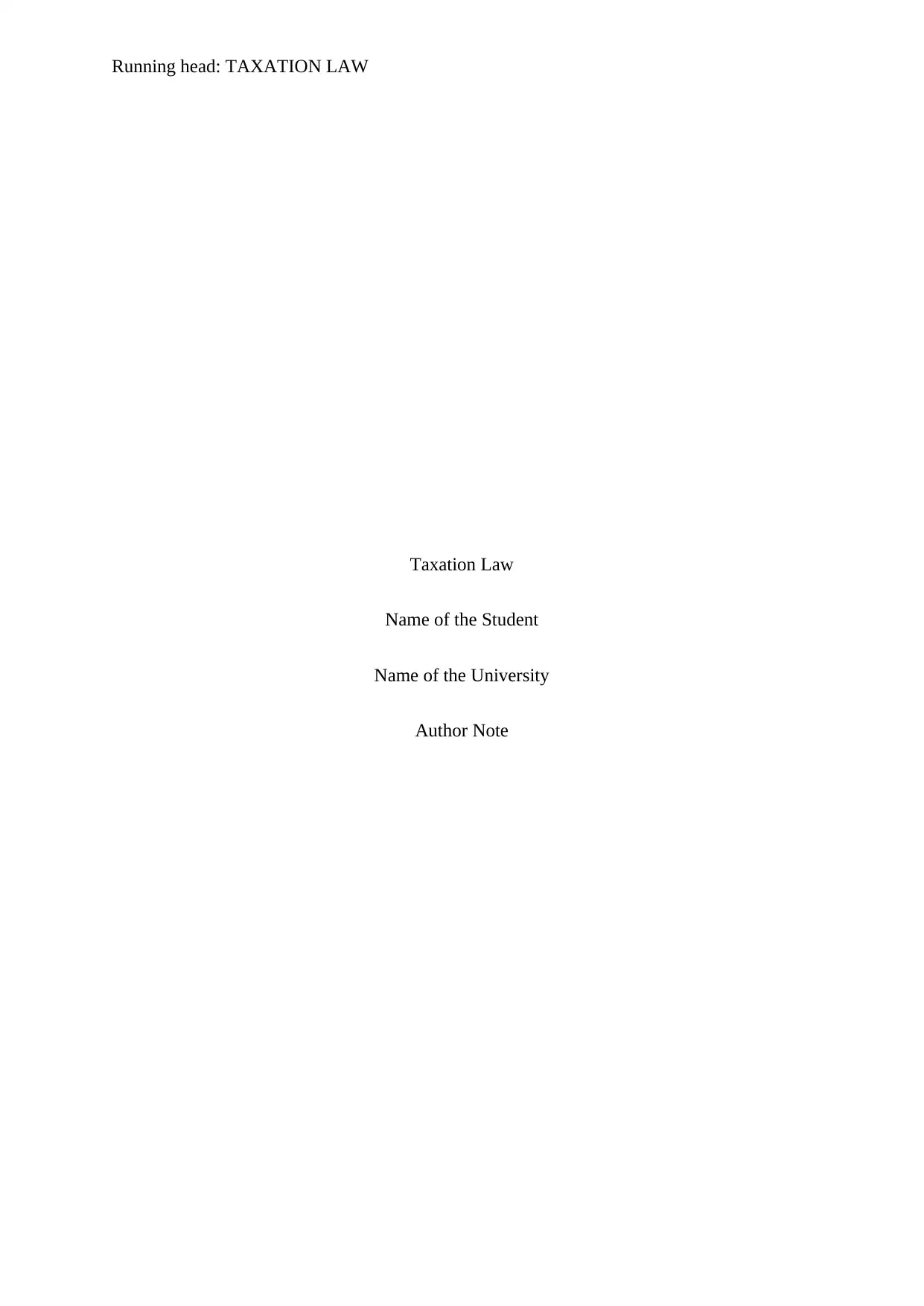
Running head: TAXATION LAW
Taxation Law
Name of the Student
Name of the University
Author Note
Taxation Law
Name of the Student
Name of the University
Author Note
Paraphrase This Document
Need a fresh take? Get an instant paraphrase of this document with our AI Paraphraser
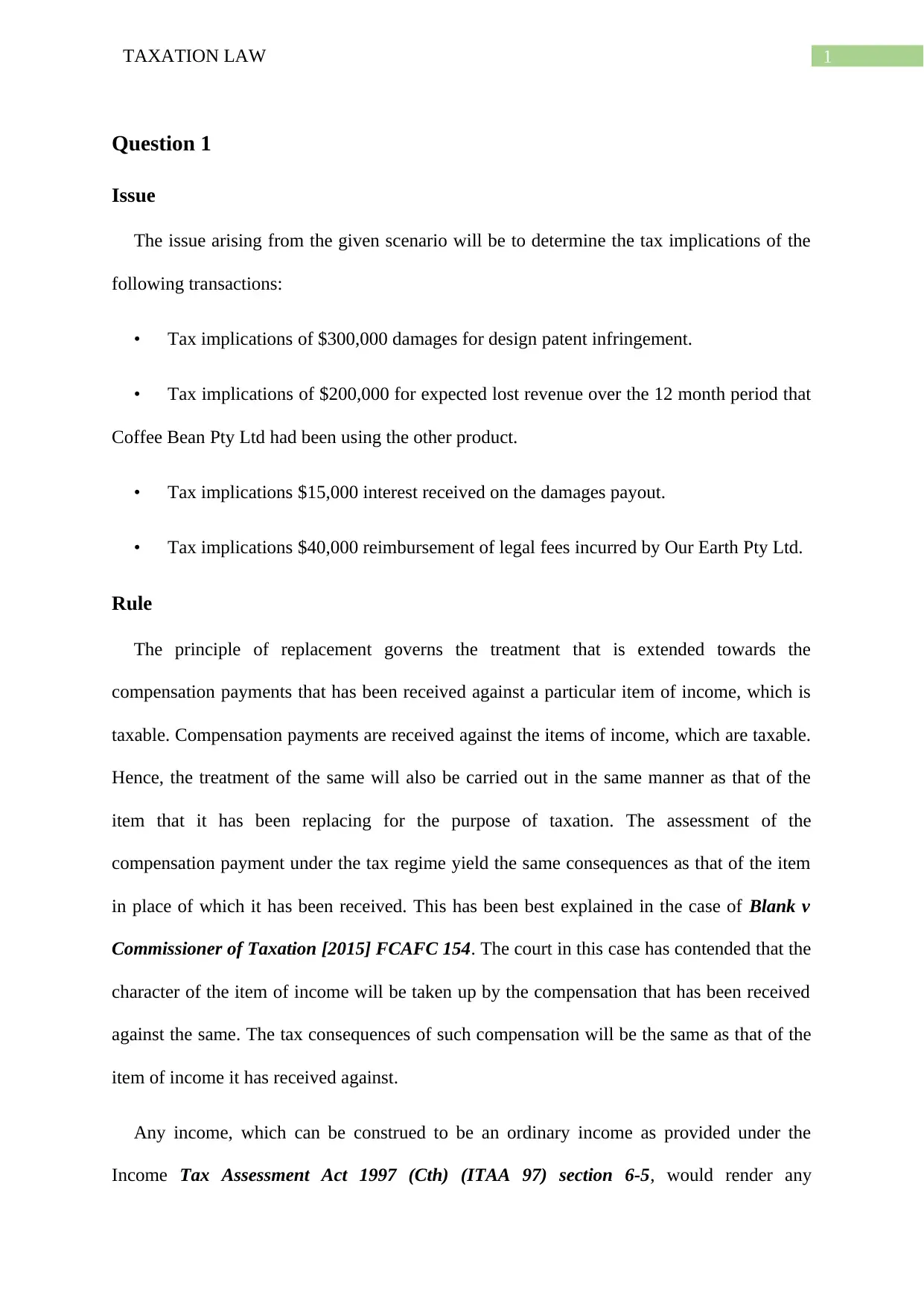
1TAXATION LAW
Question 1
Issue
The issue arising from the given scenario will be to determine the tax implications of the
following transactions:
• Tax implications of $300,000 damages for design patent infringement.
• Tax implications of $200,000 for expected lost revenue over the 12 month period that
Coffee Bean Pty Ltd had been using the other product.
• Tax implications $15,000 interest received on the damages payout.
• Tax implications $40,000 reimbursement of legal fees incurred by Our Earth Pty Ltd.
Rule
The principle of replacement governs the treatment that is extended towards the
compensation payments that has been received against a particular item of income, which is
taxable. Compensation payments are received against the items of income, which are taxable.
Hence, the treatment of the same will also be carried out in the same manner as that of the
item that it has been replacing for the purpose of taxation. The assessment of the
compensation payment under the tax regime yield the same consequences as that of the item
in place of which it has been received. This has been best explained in the case of Blank v
Commissioner of Taxation [2015] FCAFC 154. The court in this case has contended that the
character of the item of income will be taken up by the compensation that has been received
against the same. The tax consequences of such compensation will be the same as that of the
item of income it has received against.
Any income, which can be construed to be an ordinary income as provided under the
Income Tax Assessment Act 1997 (Cth) (ITAA 97) section 6-5, would render any
Question 1
Issue
The issue arising from the given scenario will be to determine the tax implications of the
following transactions:
• Tax implications of $300,000 damages for design patent infringement.
• Tax implications of $200,000 for expected lost revenue over the 12 month period that
Coffee Bean Pty Ltd had been using the other product.
• Tax implications $15,000 interest received on the damages payout.
• Tax implications $40,000 reimbursement of legal fees incurred by Our Earth Pty Ltd.
Rule
The principle of replacement governs the treatment that is extended towards the
compensation payments that has been received against a particular item of income, which is
taxable. Compensation payments are received against the items of income, which are taxable.
Hence, the treatment of the same will also be carried out in the same manner as that of the
item that it has been replacing for the purpose of taxation. The assessment of the
compensation payment under the tax regime yield the same consequences as that of the item
in place of which it has been received. This has been best explained in the case of Blank v
Commissioner of Taxation [2015] FCAFC 154. The court in this case has contended that the
character of the item of income will be taken up by the compensation that has been received
against the same. The tax consequences of such compensation will be the same as that of the
item of income it has received against.
Any income, which can be construed to be an ordinary income as provided under the
Income Tax Assessment Act 1997 (Cth) (ITAA 97) section 6-5, would render any
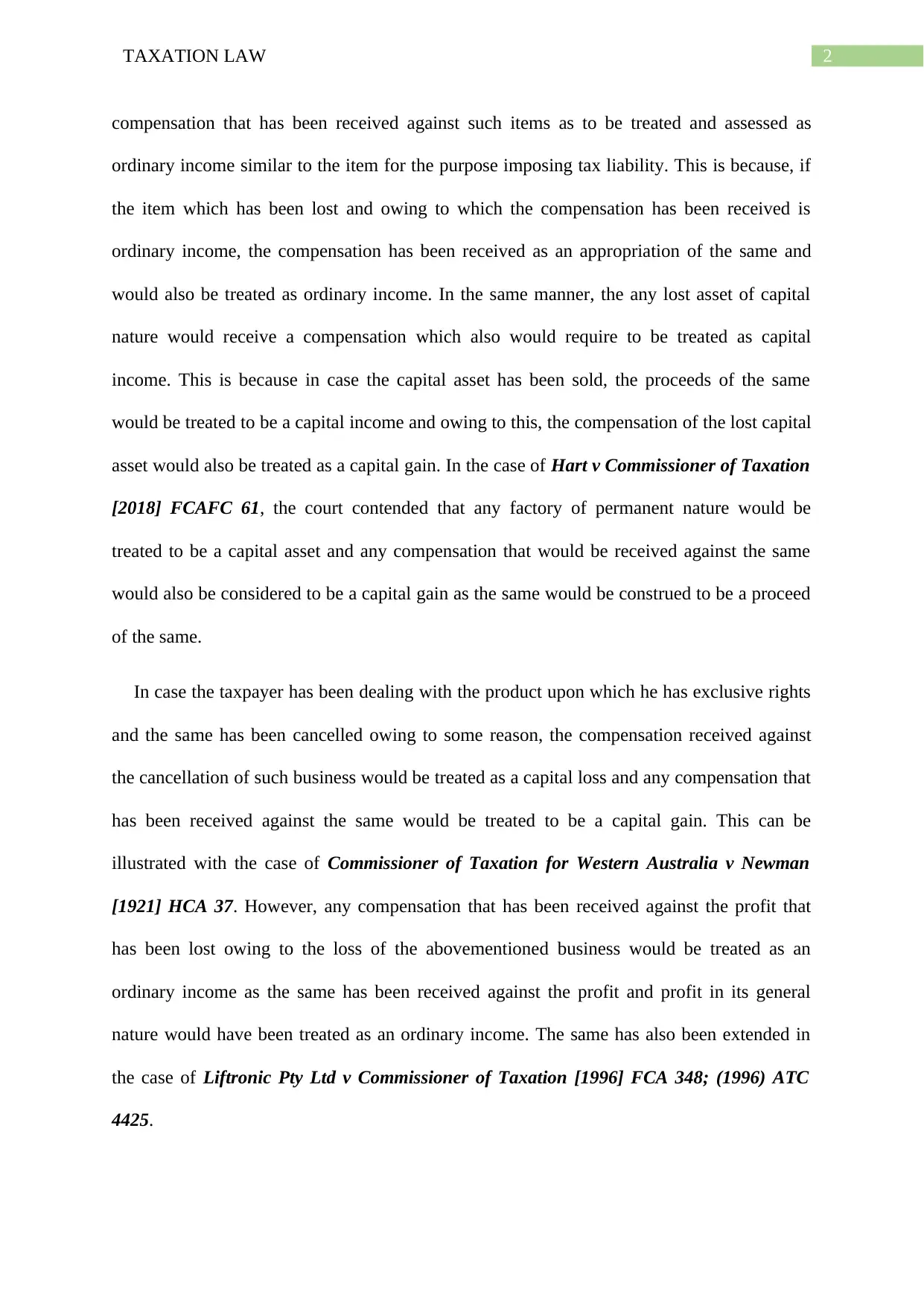
2TAXATION LAW
compensation that has been received against such items as to be treated and assessed as
ordinary income similar to the item for the purpose imposing tax liability. This is because, if
the item which has been lost and owing to which the compensation has been received is
ordinary income, the compensation has been received as an appropriation of the same and
would also be treated as ordinary income. In the same manner, the any lost asset of capital
nature would receive a compensation which also would require to be treated as capital
income. This is because in case the capital asset has been sold, the proceeds of the same
would be treated to be a capital income and owing to this, the compensation of the lost capital
asset would also be treated as a capital gain. In the case of Hart v Commissioner of Taxation
[2018] FCAFC 61, the court contended that any factory of permanent nature would be
treated to be a capital asset and any compensation that would be received against the same
would also be considered to be a capital gain as the same would be construed to be a proceed
of the same.
In case the taxpayer has been dealing with the product upon which he has exclusive rights
and the same has been cancelled owing to some reason, the compensation received against
the cancellation of such business would be treated as a capital loss and any compensation that
has been received against the same would be treated to be a capital gain. This can be
illustrated with the case of Commissioner of Taxation for Western Australia v Newman
[1921] HCA 37. However, any compensation that has been received against the profit that
has been lost owing to the loss of the abovementioned business would be treated as an
ordinary income as the same has been received against the profit and profit in its general
nature would have been treated as an ordinary income. The same has also been extended in
the case of Liftronic Pty Ltd v Commissioner of Taxation [1996] FCA 348; (1996) ATC
4425.
compensation that has been received against such items as to be treated and assessed as
ordinary income similar to the item for the purpose imposing tax liability. This is because, if
the item which has been lost and owing to which the compensation has been received is
ordinary income, the compensation has been received as an appropriation of the same and
would also be treated as ordinary income. In the same manner, the any lost asset of capital
nature would receive a compensation which also would require to be treated as capital
income. This is because in case the capital asset has been sold, the proceeds of the same
would be treated to be a capital income and owing to this, the compensation of the lost capital
asset would also be treated as a capital gain. In the case of Hart v Commissioner of Taxation
[2018] FCAFC 61, the court contended that any factory of permanent nature would be
treated to be a capital asset and any compensation that would be received against the same
would also be considered to be a capital gain as the same would be construed to be a proceed
of the same.
In case the taxpayer has been dealing with the product upon which he has exclusive rights
and the same has been cancelled owing to some reason, the compensation received against
the cancellation of such business would be treated as a capital loss and any compensation that
has been received against the same would be treated to be a capital gain. This can be
illustrated with the case of Commissioner of Taxation for Western Australia v Newman
[1921] HCA 37. However, any compensation that has been received against the profit that
has been lost owing to the loss of the abovementioned business would be treated as an
ordinary income as the same has been received against the profit and profit in its general
nature would have been treated as an ordinary income. The same has also been extended in
the case of Liftronic Pty Ltd v Commissioner of Taxation [1996] FCA 348; (1996) ATC
4425.
⊘ This is a preview!⊘
Do you want full access?
Subscribe today to unlock all pages.

Trusted by 1+ million students worldwide
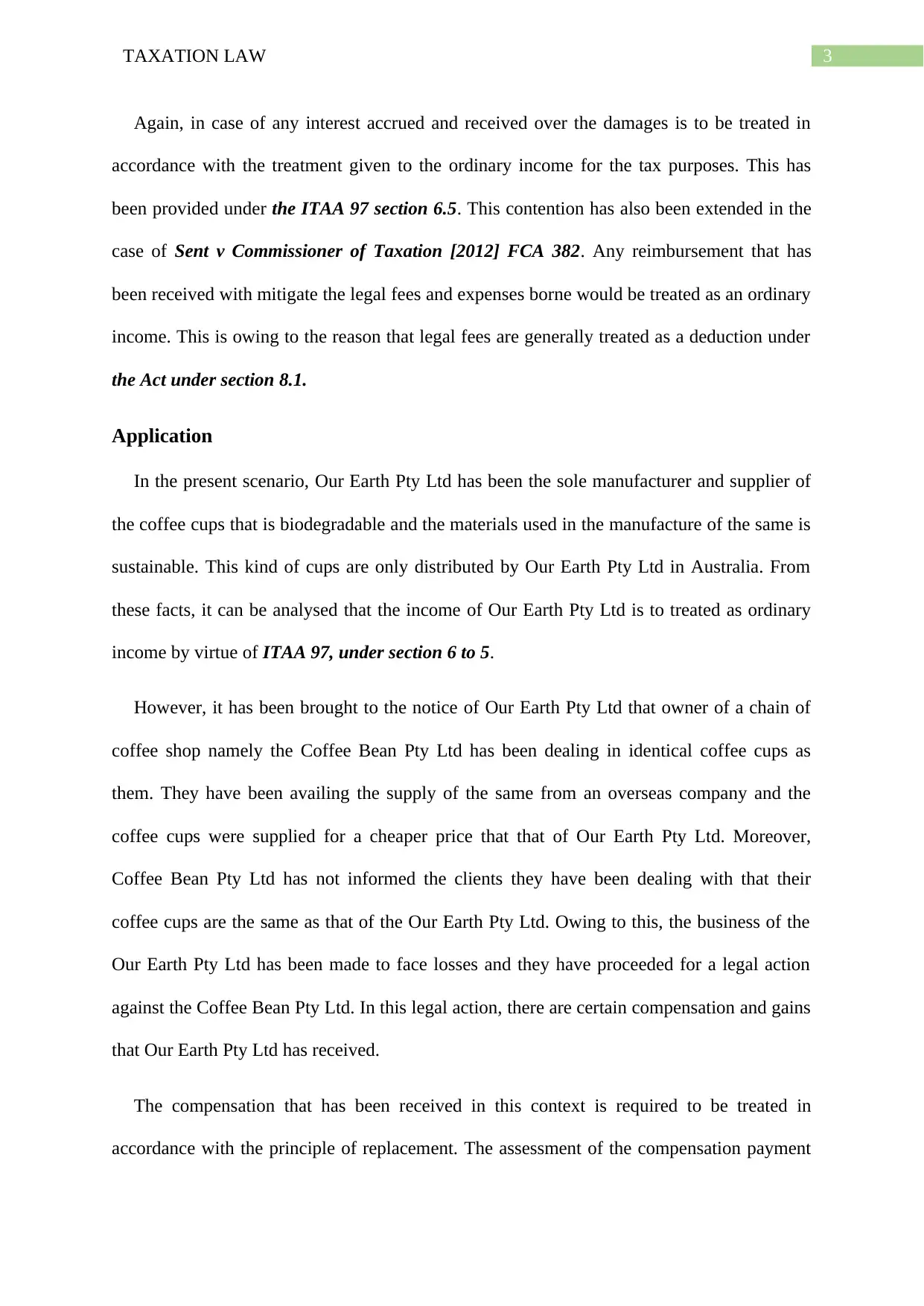
3TAXATION LAW
Again, in case of any interest accrued and received over the damages is to be treated in
accordance with the treatment given to the ordinary income for the tax purposes. This has
been provided under the ITAA 97 section 6.5. This contention has also been extended in the
case of Sent v Commissioner of Taxation [2012] FCA 382. Any reimbursement that has
been received with mitigate the legal fees and expenses borne would be treated as an ordinary
income. This is owing to the reason that legal fees are generally treated as a deduction under
the Act under section 8.1.
Application
In the present scenario, Our Earth Pty Ltd has been the sole manufacturer and supplier of
the coffee cups that is biodegradable and the materials used in the manufacture of the same is
sustainable. This kind of cups are only distributed by Our Earth Pty Ltd in Australia. From
these facts, it can be analysed that the income of Our Earth Pty Ltd is to treated as ordinary
income by virtue of ITAA 97, under section 6 to 5.
However, it has been brought to the notice of Our Earth Pty Ltd that owner of a chain of
coffee shop namely the Coffee Bean Pty Ltd has been dealing in identical coffee cups as
them. They have been availing the supply of the same from an overseas company and the
coffee cups were supplied for a cheaper price that that of Our Earth Pty Ltd. Moreover,
Coffee Bean Pty Ltd has not informed the clients they have been dealing with that their
coffee cups are the same as that of the Our Earth Pty Ltd. Owing to this, the business of the
Our Earth Pty Ltd has been made to face losses and they have proceeded for a legal action
against the Coffee Bean Pty Ltd. In this legal action, there are certain compensation and gains
that Our Earth Pty Ltd has received.
The compensation that has been received in this context is required to be treated in
accordance with the principle of replacement. The assessment of the compensation payment
Again, in case of any interest accrued and received over the damages is to be treated in
accordance with the treatment given to the ordinary income for the tax purposes. This has
been provided under the ITAA 97 section 6.5. This contention has also been extended in the
case of Sent v Commissioner of Taxation [2012] FCA 382. Any reimbursement that has
been received with mitigate the legal fees and expenses borne would be treated as an ordinary
income. This is owing to the reason that legal fees are generally treated as a deduction under
the Act under section 8.1.
Application
In the present scenario, Our Earth Pty Ltd has been the sole manufacturer and supplier of
the coffee cups that is biodegradable and the materials used in the manufacture of the same is
sustainable. This kind of cups are only distributed by Our Earth Pty Ltd in Australia. From
these facts, it can be analysed that the income of Our Earth Pty Ltd is to treated as ordinary
income by virtue of ITAA 97, under section 6 to 5.
However, it has been brought to the notice of Our Earth Pty Ltd that owner of a chain of
coffee shop namely the Coffee Bean Pty Ltd has been dealing in identical coffee cups as
them. They have been availing the supply of the same from an overseas company and the
coffee cups were supplied for a cheaper price that that of Our Earth Pty Ltd. Moreover,
Coffee Bean Pty Ltd has not informed the clients they have been dealing with that their
coffee cups are the same as that of the Our Earth Pty Ltd. Owing to this, the business of the
Our Earth Pty Ltd has been made to face losses and they have proceeded for a legal action
against the Coffee Bean Pty Ltd. In this legal action, there are certain compensation and gains
that Our Earth Pty Ltd has received.
The compensation that has been received in this context is required to be treated in
accordance with the principle of replacement. The assessment of the compensation payment
Paraphrase This Document
Need a fresh take? Get an instant paraphrase of this document with our AI Paraphraser
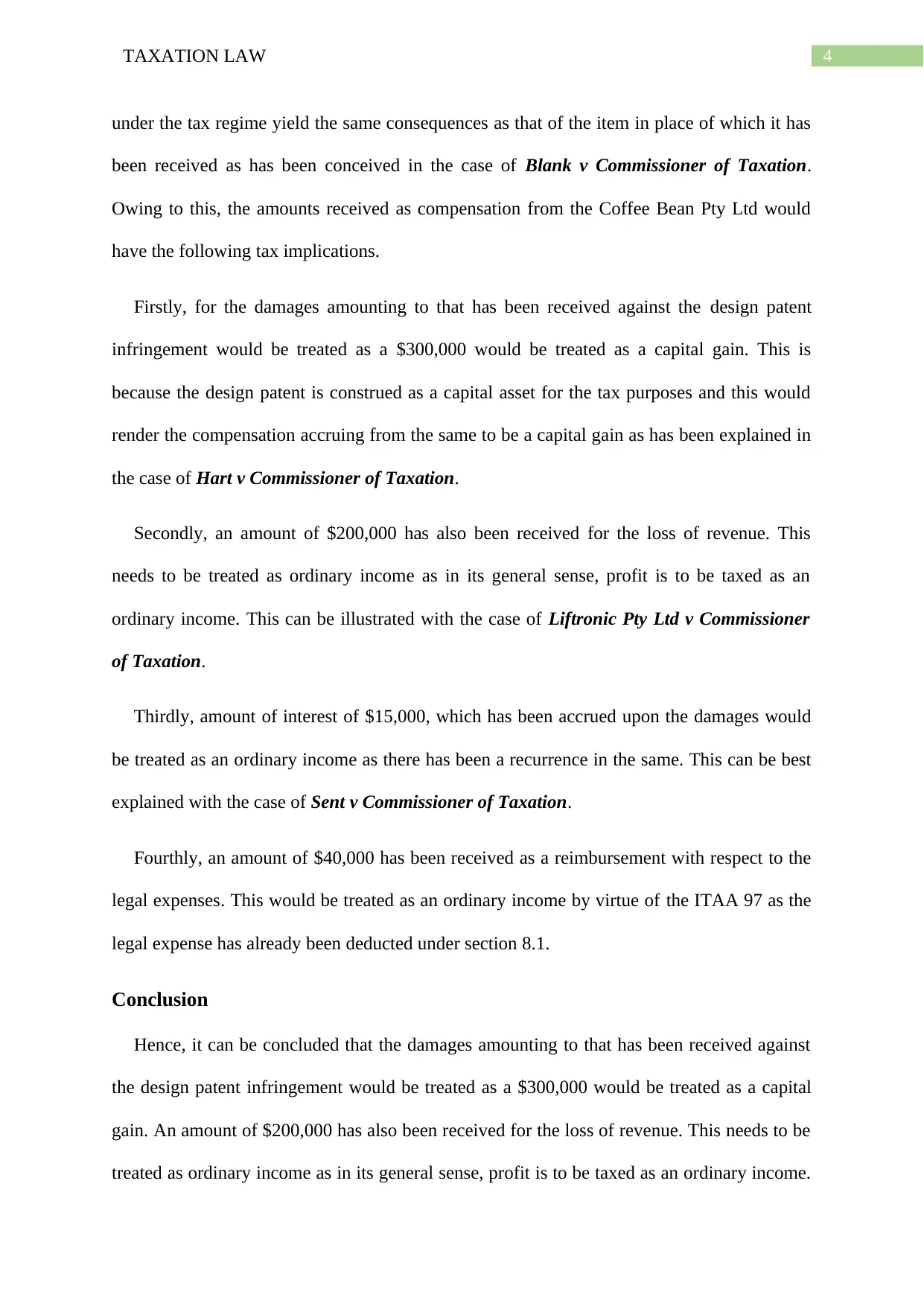
4TAXATION LAW
under the tax regime yield the same consequences as that of the item in place of which it has
been received as has been conceived in the case of Blank v Commissioner of Taxation.
Owing to this, the amounts received as compensation from the Coffee Bean Pty Ltd would
have the following tax implications.
Firstly, for the damages amounting to that has been received against the design patent
infringement would be treated as a $300,000 would be treated as a capital gain. This is
because the design patent is construed as a capital asset for the tax purposes and this would
render the compensation accruing from the same to be a capital gain as has been explained in
the case of Hart v Commissioner of Taxation.
Secondly, an amount of $200,000 has also been received for the loss of revenue. This
needs to be treated as ordinary income as in its general sense, profit is to be taxed as an
ordinary income. This can be illustrated with the case of Liftronic Pty Ltd v Commissioner
of Taxation.
Thirdly, amount of interest of $15,000, which has been accrued upon the damages would
be treated as an ordinary income as there has been a recurrence in the same. This can be best
explained with the case of Sent v Commissioner of Taxation.
Fourthly, an amount of $40,000 has been received as a reimbursement with respect to the
legal expenses. This would be treated as an ordinary income by virtue of the ITAA 97 as the
legal expense has already been deducted under section 8.1.
Conclusion
Hence, it can be concluded that the damages amounting to that has been received against
the design patent infringement would be treated as a $300,000 would be treated as a capital
gain. An amount of $200,000 has also been received for the loss of revenue. This needs to be
treated as ordinary income as in its general sense, profit is to be taxed as an ordinary income.
under the tax regime yield the same consequences as that of the item in place of which it has
been received as has been conceived in the case of Blank v Commissioner of Taxation.
Owing to this, the amounts received as compensation from the Coffee Bean Pty Ltd would
have the following tax implications.
Firstly, for the damages amounting to that has been received against the design patent
infringement would be treated as a $300,000 would be treated as a capital gain. This is
because the design patent is construed as a capital asset for the tax purposes and this would
render the compensation accruing from the same to be a capital gain as has been explained in
the case of Hart v Commissioner of Taxation.
Secondly, an amount of $200,000 has also been received for the loss of revenue. This
needs to be treated as ordinary income as in its general sense, profit is to be taxed as an
ordinary income. This can be illustrated with the case of Liftronic Pty Ltd v Commissioner
of Taxation.
Thirdly, amount of interest of $15,000, which has been accrued upon the damages would
be treated as an ordinary income as there has been a recurrence in the same. This can be best
explained with the case of Sent v Commissioner of Taxation.
Fourthly, an amount of $40,000 has been received as a reimbursement with respect to the
legal expenses. This would be treated as an ordinary income by virtue of the ITAA 97 as the
legal expense has already been deducted under section 8.1.
Conclusion
Hence, it can be concluded that the damages amounting to that has been received against
the design patent infringement would be treated as a $300,000 would be treated as a capital
gain. An amount of $200,000 has also been received for the loss of revenue. This needs to be
treated as ordinary income as in its general sense, profit is to be taxed as an ordinary income.
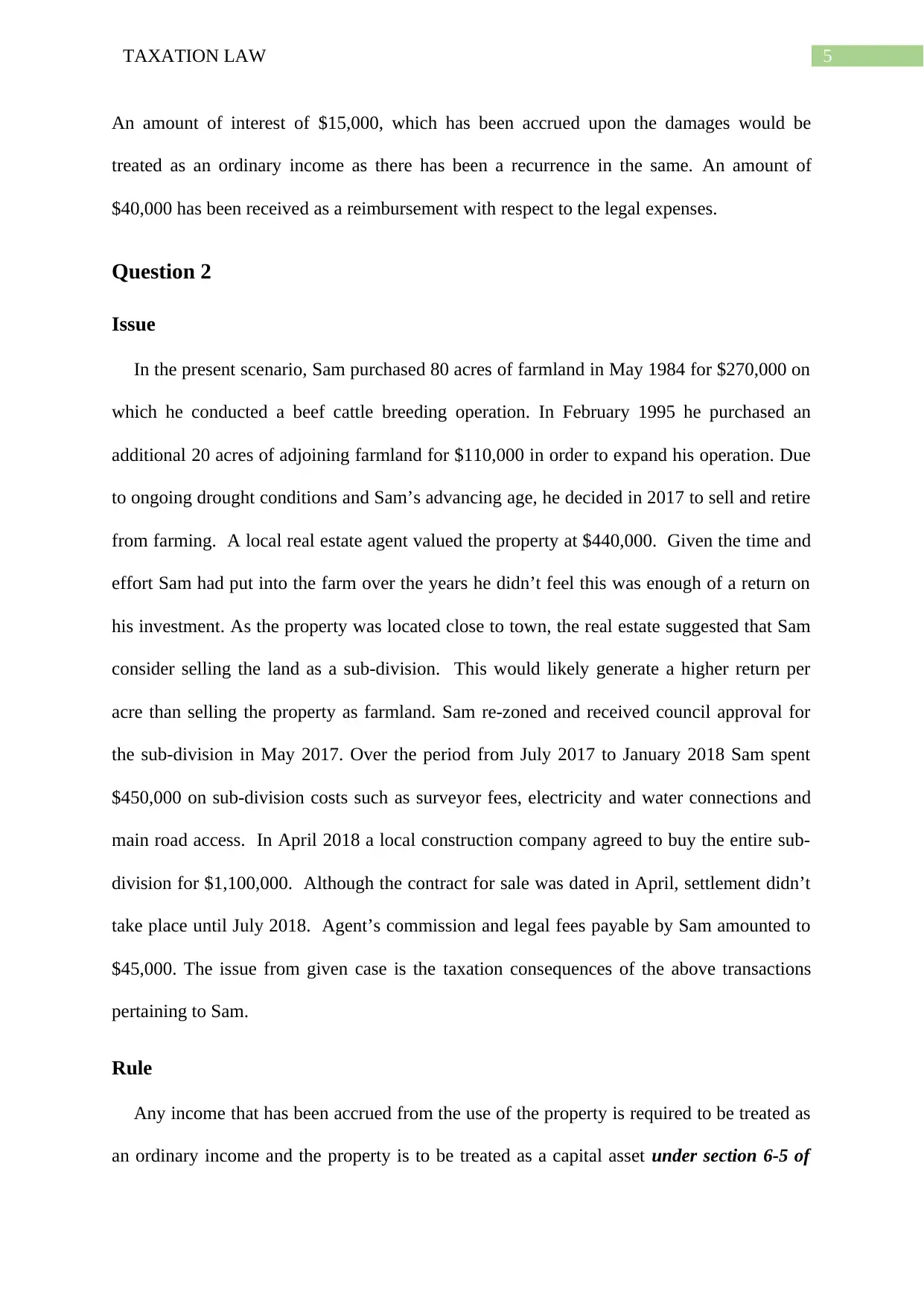
5TAXATION LAW
An amount of interest of $15,000, which has been accrued upon the damages would be
treated as an ordinary income as there has been a recurrence in the same. An amount of
$40,000 has been received as a reimbursement with respect to the legal expenses.
Question 2
Issue
In the present scenario, Sam purchased 80 acres of farmland in May 1984 for $270,000 on
which he conducted a beef cattle breeding operation. In February 1995 he purchased an
additional 20 acres of adjoining farmland for $110,000 in order to expand his operation. Due
to ongoing drought conditions and Sam’s advancing age, he decided in 2017 to sell and retire
from farming. A local real estate agent valued the property at $440,000. Given the time and
effort Sam had put into the farm over the years he didn’t feel this was enough of a return on
his investment. As the property was located close to town, the real estate suggested that Sam
consider selling the land as a sub-division. This would likely generate a higher return per
acre than selling the property as farmland. Sam re-zoned and received council approval for
the sub-division in May 2017. Over the period from July 2017 to January 2018 Sam spent
$450,000 on sub-division costs such as surveyor fees, electricity and water connections and
main road access. In April 2018 a local construction company agreed to buy the entire sub-
division for $1,100,000. Although the contract for sale was dated in April, settlement didn’t
take place until July 2018. Agent’s commission and legal fees payable by Sam amounted to
$45,000. The issue from given case is the taxation consequences of the above transactions
pertaining to Sam.
Rule
Any income that has been accrued from the use of the property is required to be treated as
an ordinary income and the property is to be treated as a capital asset under section 6-5 of
An amount of interest of $15,000, which has been accrued upon the damages would be
treated as an ordinary income as there has been a recurrence in the same. An amount of
$40,000 has been received as a reimbursement with respect to the legal expenses.
Question 2
Issue
In the present scenario, Sam purchased 80 acres of farmland in May 1984 for $270,000 on
which he conducted a beef cattle breeding operation. In February 1995 he purchased an
additional 20 acres of adjoining farmland for $110,000 in order to expand his operation. Due
to ongoing drought conditions and Sam’s advancing age, he decided in 2017 to sell and retire
from farming. A local real estate agent valued the property at $440,000. Given the time and
effort Sam had put into the farm over the years he didn’t feel this was enough of a return on
his investment. As the property was located close to town, the real estate suggested that Sam
consider selling the land as a sub-division. This would likely generate a higher return per
acre than selling the property as farmland. Sam re-zoned and received council approval for
the sub-division in May 2017. Over the period from July 2017 to January 2018 Sam spent
$450,000 on sub-division costs such as surveyor fees, electricity and water connections and
main road access. In April 2018 a local construction company agreed to buy the entire sub-
division for $1,100,000. Although the contract for sale was dated in April, settlement didn’t
take place until July 2018. Agent’s commission and legal fees payable by Sam amounted to
$45,000. The issue from given case is the taxation consequences of the above transactions
pertaining to Sam.
Rule
Any income that has been accrued from the use of the property is required to be treated as
an ordinary income and the property is to be treated as a capital asset under section 6-5 of
⊘ This is a preview!⊘
Do you want full access?
Subscribe today to unlock all pages.

Trusted by 1+ million students worldwide
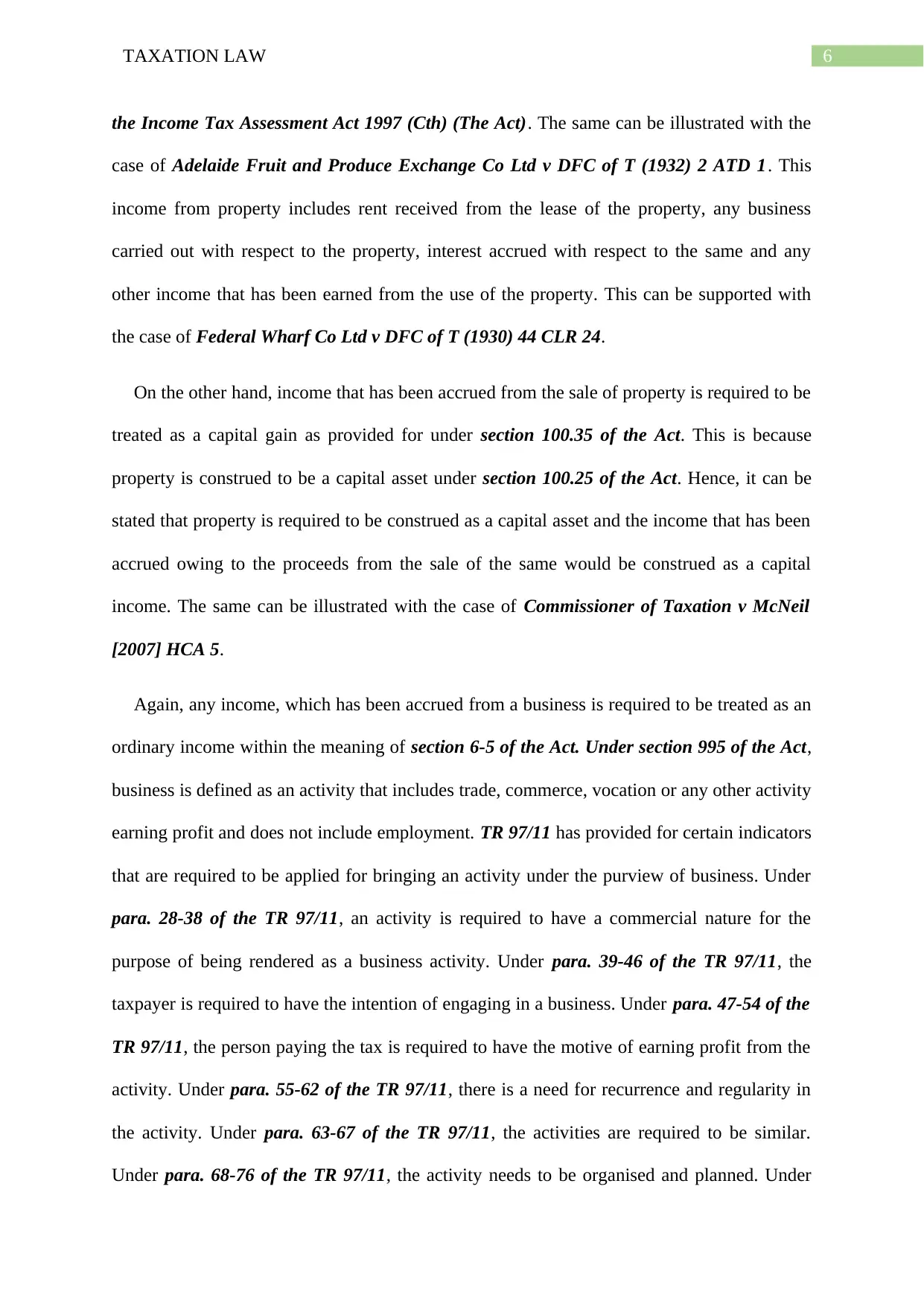
6TAXATION LAW
the Income Tax Assessment Act 1997 (Cth) (The Act). The same can be illustrated with the
case of Adelaide Fruit and Produce Exchange Co Ltd v DFC of T (1932) 2 ATD 1. This
income from property includes rent received from the lease of the property, any business
carried out with respect to the property, interest accrued with respect to the same and any
other income that has been earned from the use of the property. This can be supported with
the case of Federal Wharf Co Ltd v DFC of T (1930) 44 CLR 24.
On the other hand, income that has been accrued from the sale of property is required to be
treated as a capital gain as provided for under section 100.35 of the Act. This is because
property is construed to be a capital asset under section 100.25 of the Act. Hence, it can be
stated that property is required to be construed as a capital asset and the income that has been
accrued owing to the proceeds from the sale of the same would be construed as a capital
income. The same can be illustrated with the case of Commissioner of Taxation v McNeil
[2007] HCA 5.
Again, any income, which has been accrued from a business is required to be treated as an
ordinary income within the meaning of section 6-5 of the Act. Under section 995 of the Act,
business is defined as an activity that includes trade, commerce, vocation or any other activity
earning profit and does not include employment. TR 97/11 has provided for certain indicators
that are required to be applied for bringing an activity under the purview of business. Under
para. 28-38 of the TR 97/11, an activity is required to have a commercial nature for the
purpose of being rendered as a business activity. Under para. 39-46 of the TR 97/11, the
taxpayer is required to have the intention of engaging in a business. Under para. 47-54 of the
TR 97/11, the person paying the tax is required to have the motive of earning profit from the
activity. Under para. 55-62 of the TR 97/11, there is a need for recurrence and regularity in
the activity. Under para. 63-67 of the TR 97/11, the activities are required to be similar.
Under para. 68-76 of the TR 97/11, the activity needs to be organised and planned. Under
the Income Tax Assessment Act 1997 (Cth) (The Act). The same can be illustrated with the
case of Adelaide Fruit and Produce Exchange Co Ltd v DFC of T (1932) 2 ATD 1. This
income from property includes rent received from the lease of the property, any business
carried out with respect to the property, interest accrued with respect to the same and any
other income that has been earned from the use of the property. This can be supported with
the case of Federal Wharf Co Ltd v DFC of T (1930) 44 CLR 24.
On the other hand, income that has been accrued from the sale of property is required to be
treated as a capital gain as provided for under section 100.35 of the Act. This is because
property is construed to be a capital asset under section 100.25 of the Act. Hence, it can be
stated that property is required to be construed as a capital asset and the income that has been
accrued owing to the proceeds from the sale of the same would be construed as a capital
income. The same can be illustrated with the case of Commissioner of Taxation v McNeil
[2007] HCA 5.
Again, any income, which has been accrued from a business is required to be treated as an
ordinary income within the meaning of section 6-5 of the Act. Under section 995 of the Act,
business is defined as an activity that includes trade, commerce, vocation or any other activity
earning profit and does not include employment. TR 97/11 has provided for certain indicators
that are required to be applied for bringing an activity under the purview of business. Under
para. 28-38 of the TR 97/11, an activity is required to have a commercial nature for the
purpose of being rendered as a business activity. Under para. 39-46 of the TR 97/11, the
taxpayer is required to have the intention of engaging in a business. Under para. 47-54 of the
TR 97/11, the person paying the tax is required to have the motive of earning profit from the
activity. Under para. 55-62 of the TR 97/11, there is a need for recurrence and regularity in
the activity. Under para. 63-67 of the TR 97/11, the activities are required to be similar.
Under para. 68-76 of the TR 97/11, the activity needs to be organised and planned. Under
Paraphrase This Document
Need a fresh take? Get an instant paraphrase of this document with our AI Paraphraser
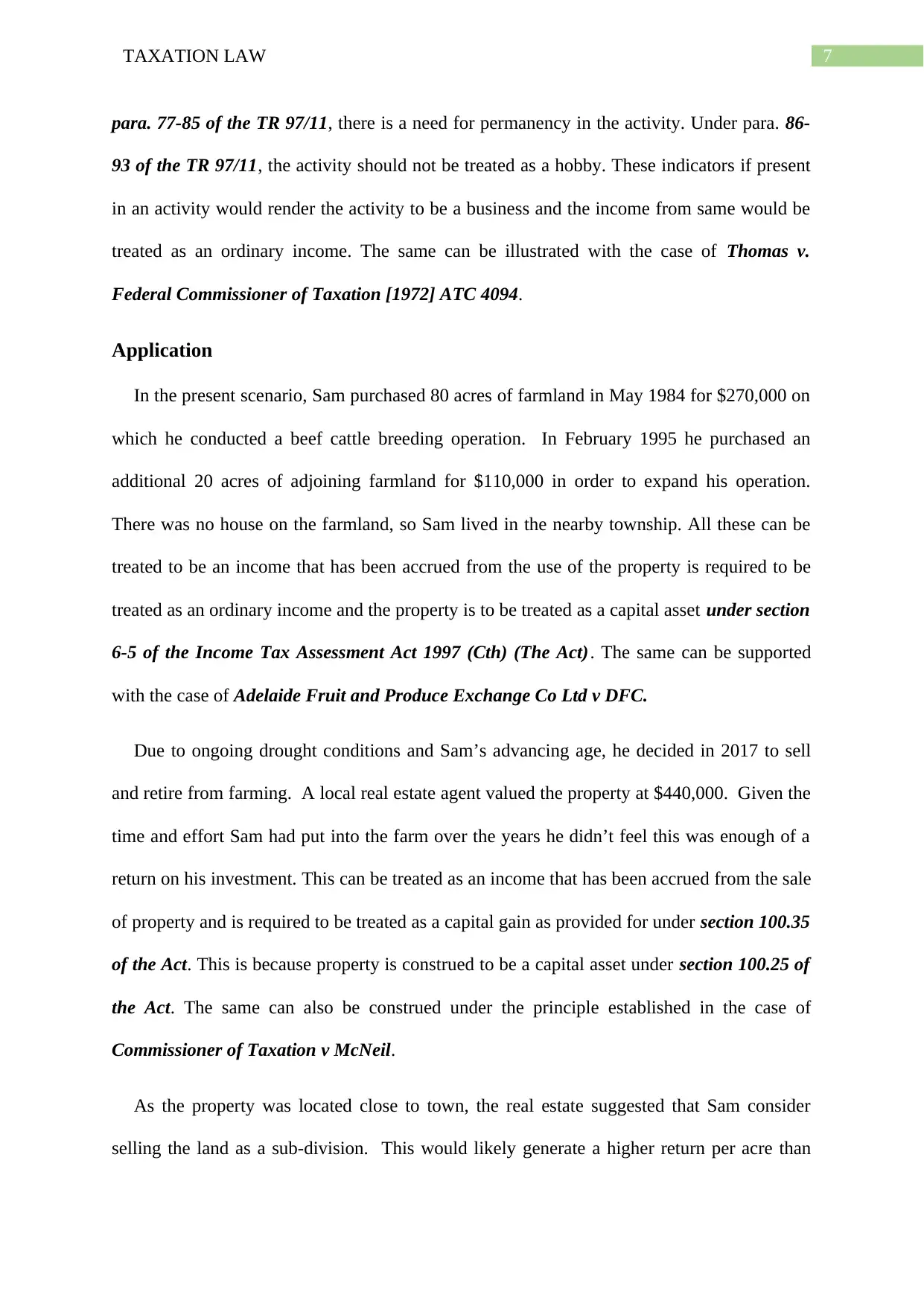
7TAXATION LAW
para. 77-85 of the TR 97/11, there is a need for permanency in the activity. Under para. 86-
93 of the TR 97/11, the activity should not be treated as a hobby. These indicators if present
in an activity would render the activity to be a business and the income from same would be
treated as an ordinary income. The same can be illustrated with the case of Thomas v.
Federal Commissioner of Taxation [1972] ATC 4094.
Application
In the present scenario, Sam purchased 80 acres of farmland in May 1984 for $270,000 on
which he conducted a beef cattle breeding operation. In February 1995 he purchased an
additional 20 acres of adjoining farmland for $110,000 in order to expand his operation.
There was no house on the farmland, so Sam lived in the nearby township. All these can be
treated to be an income that has been accrued from the use of the property is required to be
treated as an ordinary income and the property is to be treated as a capital asset under section
6-5 of the Income Tax Assessment Act 1997 (Cth) (The Act). The same can be supported
with the case of Adelaide Fruit and Produce Exchange Co Ltd v DFC.
Due to ongoing drought conditions and Sam’s advancing age, he decided in 2017 to sell
and retire from farming. A local real estate agent valued the property at $440,000. Given the
time and effort Sam had put into the farm over the years he didn’t feel this was enough of a
return on his investment. This can be treated as an income that has been accrued from the sale
of property and is required to be treated as a capital gain as provided for under section 100.35
of the Act. This is because property is construed to be a capital asset under section 100.25 of
the Act. The same can also be construed under the principle established in the case of
Commissioner of Taxation v McNeil.
As the property was located close to town, the real estate suggested that Sam consider
selling the land as a sub-division. This would likely generate a higher return per acre than
para. 77-85 of the TR 97/11, there is a need for permanency in the activity. Under para. 86-
93 of the TR 97/11, the activity should not be treated as a hobby. These indicators if present
in an activity would render the activity to be a business and the income from same would be
treated as an ordinary income. The same can be illustrated with the case of Thomas v.
Federal Commissioner of Taxation [1972] ATC 4094.
Application
In the present scenario, Sam purchased 80 acres of farmland in May 1984 for $270,000 on
which he conducted a beef cattle breeding operation. In February 1995 he purchased an
additional 20 acres of adjoining farmland for $110,000 in order to expand his operation.
There was no house on the farmland, so Sam lived in the nearby township. All these can be
treated to be an income that has been accrued from the use of the property is required to be
treated as an ordinary income and the property is to be treated as a capital asset under section
6-5 of the Income Tax Assessment Act 1997 (Cth) (The Act). The same can be supported
with the case of Adelaide Fruit and Produce Exchange Co Ltd v DFC.
Due to ongoing drought conditions and Sam’s advancing age, he decided in 2017 to sell
and retire from farming. A local real estate agent valued the property at $440,000. Given the
time and effort Sam had put into the farm over the years he didn’t feel this was enough of a
return on his investment. This can be treated as an income that has been accrued from the sale
of property and is required to be treated as a capital gain as provided for under section 100.35
of the Act. This is because property is construed to be a capital asset under section 100.25 of
the Act. The same can also be construed under the principle established in the case of
Commissioner of Taxation v McNeil.
As the property was located close to town, the real estate suggested that Sam consider
selling the land as a sub-division. This would likely generate a higher return per acre than
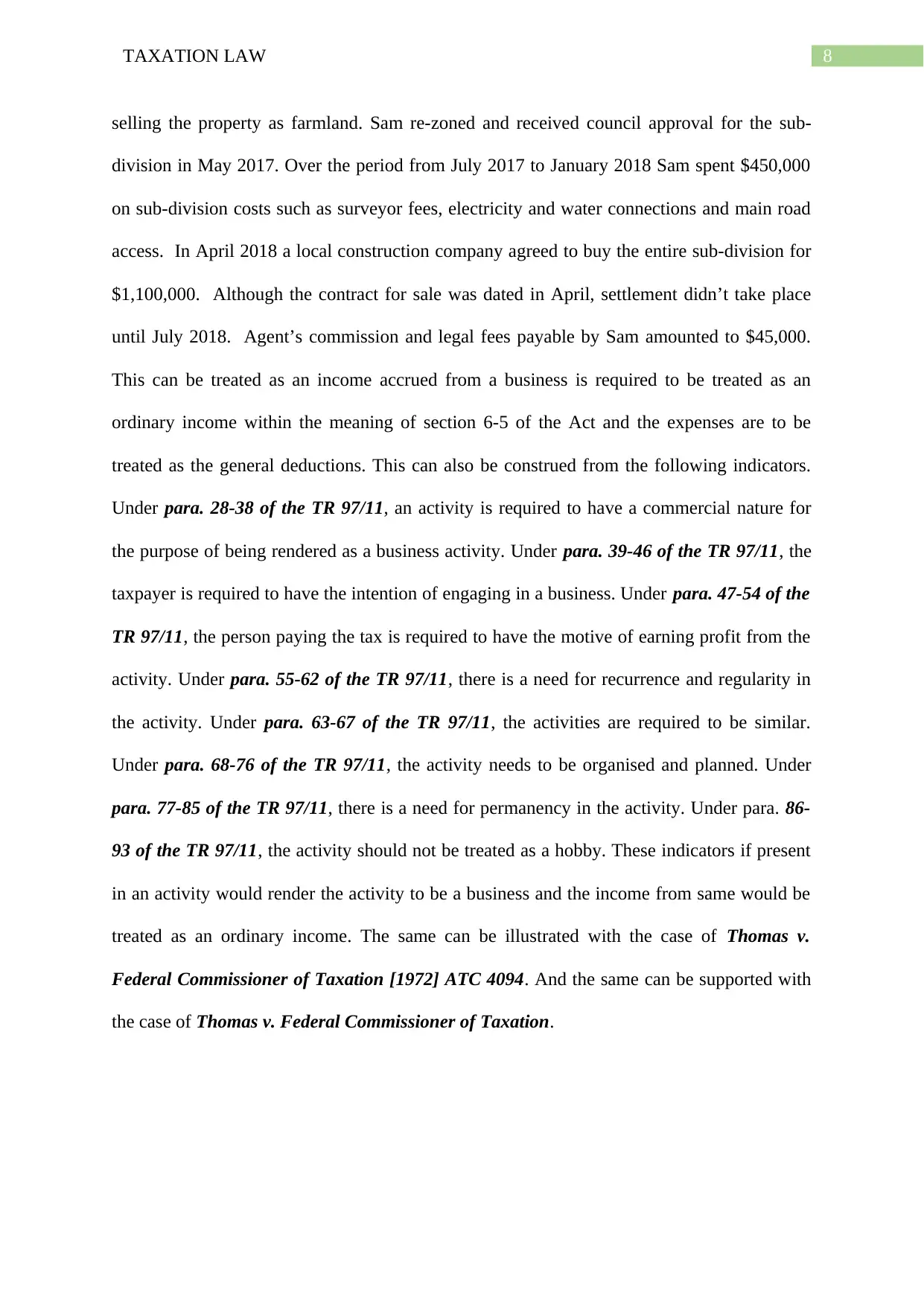
8TAXATION LAW
selling the property as farmland. Sam re-zoned and received council approval for the sub-
division in May 2017. Over the period from July 2017 to January 2018 Sam spent $450,000
on sub-division costs such as surveyor fees, electricity and water connections and main road
access. In April 2018 a local construction company agreed to buy the entire sub-division for
$1,100,000. Although the contract for sale was dated in April, settlement didn’t take place
until July 2018. Agent’s commission and legal fees payable by Sam amounted to $45,000.
This can be treated as an income accrued from a business is required to be treated as an
ordinary income within the meaning of section 6-5 of the Act and the expenses are to be
treated as the general deductions. This can also be construed from the following indicators.
Under para. 28-38 of the TR 97/11, an activity is required to have a commercial nature for
the purpose of being rendered as a business activity. Under para. 39-46 of the TR 97/11, the
taxpayer is required to have the intention of engaging in a business. Under para. 47-54 of the
TR 97/11, the person paying the tax is required to have the motive of earning profit from the
activity. Under para. 55-62 of the TR 97/11, there is a need for recurrence and regularity in
the activity. Under para. 63-67 of the TR 97/11, the activities are required to be similar.
Under para. 68-76 of the TR 97/11, the activity needs to be organised and planned. Under
para. 77-85 of the TR 97/11, there is a need for permanency in the activity. Under para. 86-
93 of the TR 97/11, the activity should not be treated as a hobby. These indicators if present
in an activity would render the activity to be a business and the income from same would be
treated as an ordinary income. The same can be illustrated with the case of Thomas v.
Federal Commissioner of Taxation [1972] ATC 4094. And the same can be supported with
the case of Thomas v. Federal Commissioner of Taxation.
selling the property as farmland. Sam re-zoned and received council approval for the sub-
division in May 2017. Over the period from July 2017 to January 2018 Sam spent $450,000
on sub-division costs such as surveyor fees, electricity and water connections and main road
access. In April 2018 a local construction company agreed to buy the entire sub-division for
$1,100,000. Although the contract for sale was dated in April, settlement didn’t take place
until July 2018. Agent’s commission and legal fees payable by Sam amounted to $45,000.
This can be treated as an income accrued from a business is required to be treated as an
ordinary income within the meaning of section 6-5 of the Act and the expenses are to be
treated as the general deductions. This can also be construed from the following indicators.
Under para. 28-38 of the TR 97/11, an activity is required to have a commercial nature for
the purpose of being rendered as a business activity. Under para. 39-46 of the TR 97/11, the
taxpayer is required to have the intention of engaging in a business. Under para. 47-54 of the
TR 97/11, the person paying the tax is required to have the motive of earning profit from the
activity. Under para. 55-62 of the TR 97/11, there is a need for recurrence and regularity in
the activity. Under para. 63-67 of the TR 97/11, the activities are required to be similar.
Under para. 68-76 of the TR 97/11, the activity needs to be organised and planned. Under
para. 77-85 of the TR 97/11, there is a need for permanency in the activity. Under para. 86-
93 of the TR 97/11, the activity should not be treated as a hobby. These indicators if present
in an activity would render the activity to be a business and the income from same would be
treated as an ordinary income. The same can be illustrated with the case of Thomas v.
Federal Commissioner of Taxation [1972] ATC 4094. And the same can be supported with
the case of Thomas v. Federal Commissioner of Taxation.
⊘ This is a preview!⊘
Do you want full access?
Subscribe today to unlock all pages.

Trusted by 1+ million students worldwide
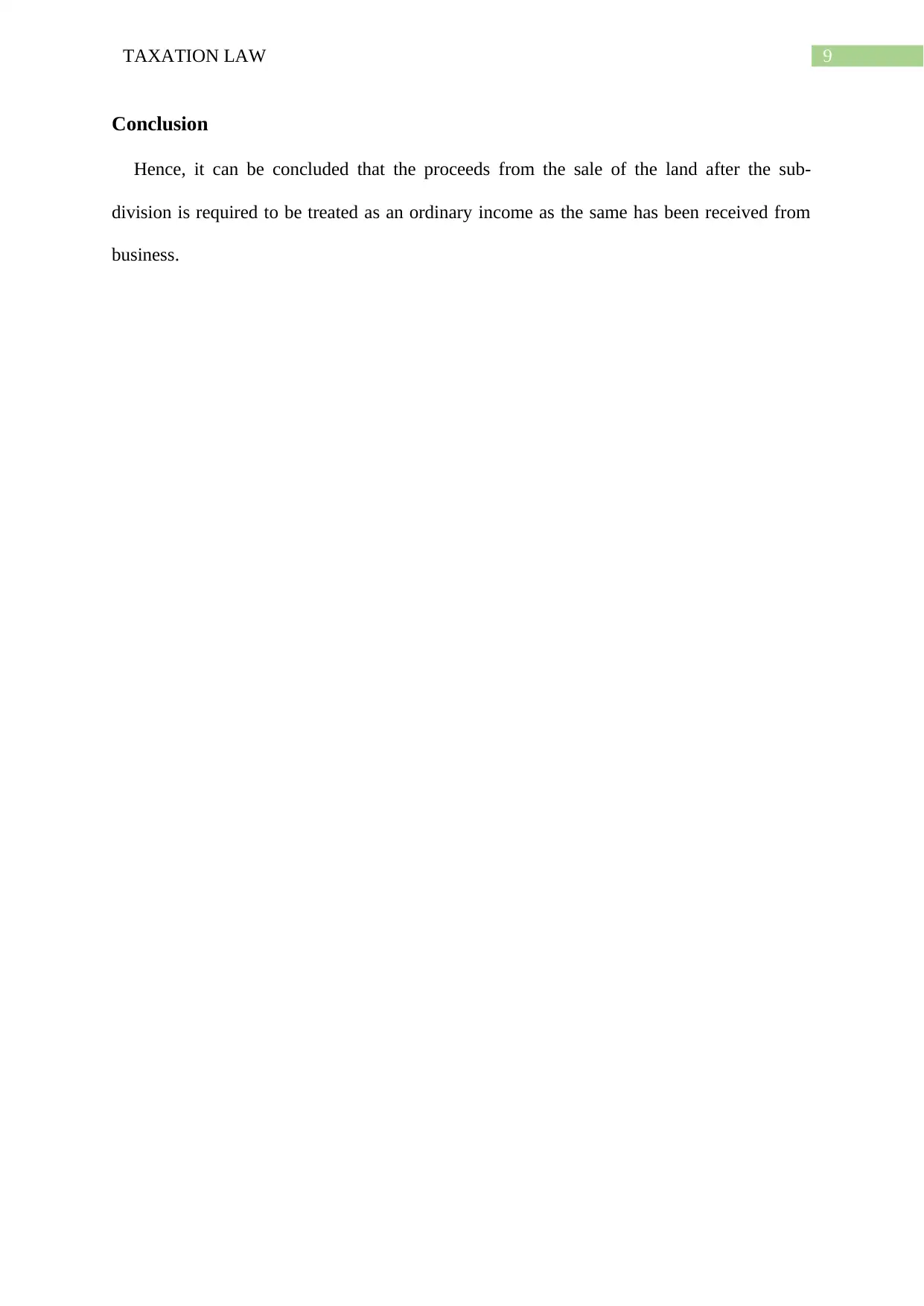
9TAXATION LAW
Conclusion
Hence, it can be concluded that the proceeds from the sale of the land after the sub-
division is required to be treated as an ordinary income as the same has been received from
business.
Conclusion
Hence, it can be concluded that the proceeds from the sale of the land after the sub-
division is required to be treated as an ordinary income as the same has been received from
business.
Paraphrase This Document
Need a fresh take? Get an instant paraphrase of this document with our AI Paraphraser
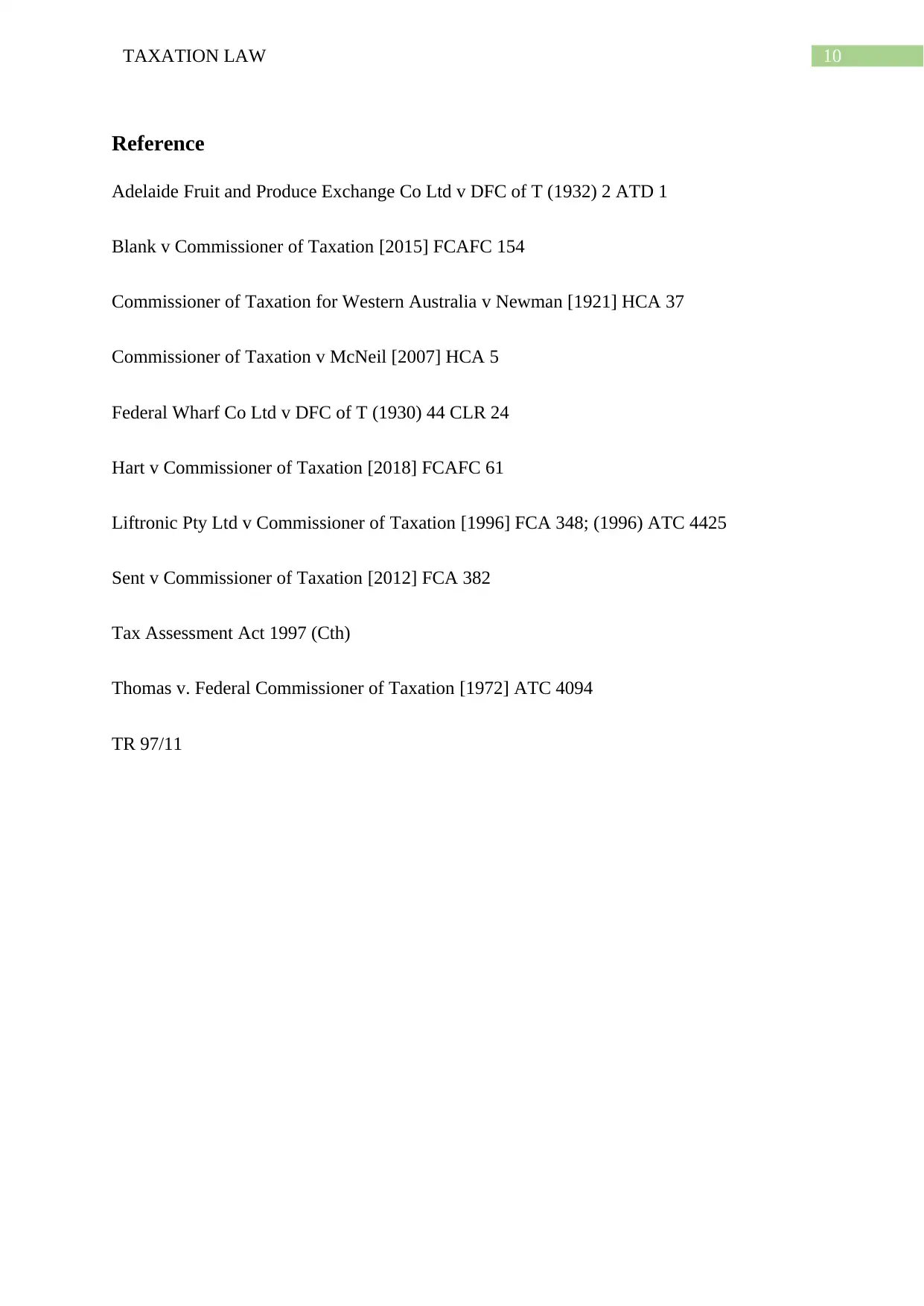
10TAXATION LAW
Reference
Adelaide Fruit and Produce Exchange Co Ltd v DFC of T (1932) 2 ATD 1
Blank v Commissioner of Taxation [2015] FCAFC 154
Commissioner of Taxation for Western Australia v Newman [1921] HCA 37
Commissioner of Taxation v McNeil [2007] HCA 5
Federal Wharf Co Ltd v DFC of T (1930) 44 CLR 24
Hart v Commissioner of Taxation [2018] FCAFC 61
Liftronic Pty Ltd v Commissioner of Taxation [1996] FCA 348; (1996) ATC 4425
Sent v Commissioner of Taxation [2012] FCA 382
Tax Assessment Act 1997 (Cth)
Thomas v. Federal Commissioner of Taxation [1972] ATC 4094
TR 97/11
Reference
Adelaide Fruit and Produce Exchange Co Ltd v DFC of T (1932) 2 ATD 1
Blank v Commissioner of Taxation [2015] FCAFC 154
Commissioner of Taxation for Western Australia v Newman [1921] HCA 37
Commissioner of Taxation v McNeil [2007] HCA 5
Federal Wharf Co Ltd v DFC of T (1930) 44 CLR 24
Hart v Commissioner of Taxation [2018] FCAFC 61
Liftronic Pty Ltd v Commissioner of Taxation [1996] FCA 348; (1996) ATC 4425
Sent v Commissioner of Taxation [2012] FCA 382
Tax Assessment Act 1997 (Cth)
Thomas v. Federal Commissioner of Taxation [1972] ATC 4094
TR 97/11
1 out of 11
Related Documents
Your All-in-One AI-Powered Toolkit for Academic Success.
+13062052269
info@desklib.com
Available 24*7 on WhatsApp / Email
![[object Object]](/_next/static/media/star-bottom.7253800d.svg)
Unlock your academic potential
Copyright © 2020–2026 A2Z Services. All Rights Reserved. Developed and managed by ZUCOL.





